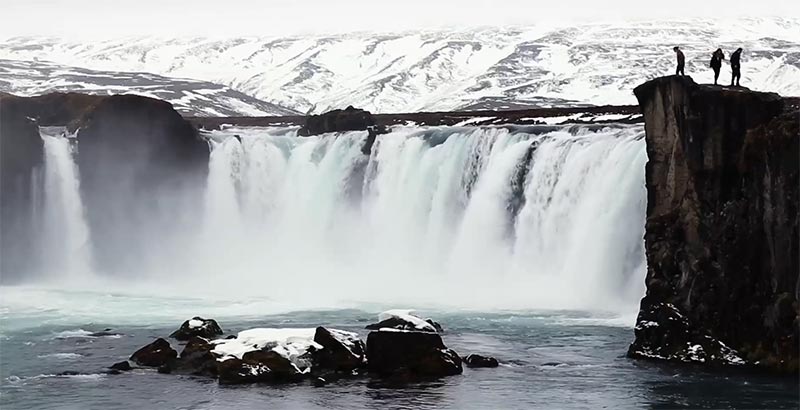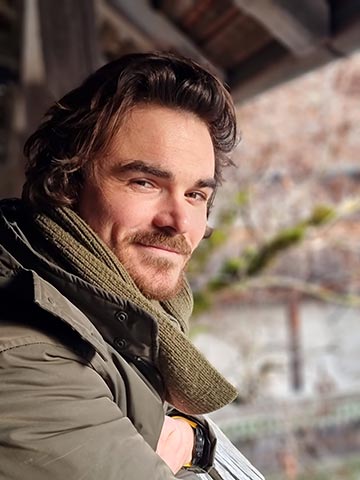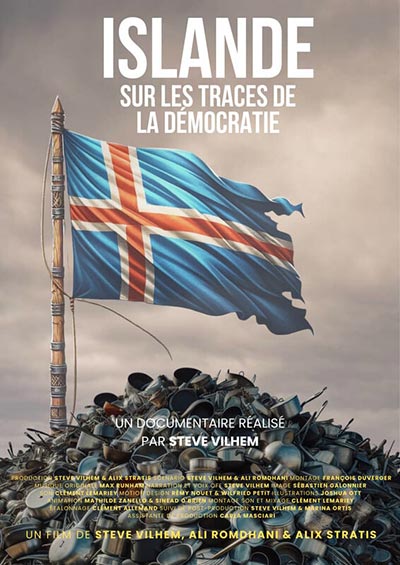
16 Sep Steve Vilhem, 2024 Free Speech Award Winner, Shows the Power of Storytelling to Advance Human Rights
Psychiatrist, anthropologist, and award-winning filmmaker. You wouldn’t expect these titles to describe the same person but they define Steve Vilhem’s unique path to become the 2024 Free Speech Award winner for his first feature film, Iceland, On the Trail of Democracy.
Although it wasn’t his initial career path, Steve’s passion for exploring societal issues and desire to tell impactful stories led him to Iceland. “Creating Iceland, On the Trail of Democracy deepened my understanding of democratic values and the power of citizen action, significantly shaping my worldview and commitment to social justice,”he said.
 The film’s summary provides some deeper context into why Steve and his team chose to make the film: The Icelandic revolution, also known as the “Pots and Pans Revolution”, occurred in October 2008 in Iceland. It was rooted in the context of the subprime financial crisis when, in less than a month, the country’s three main banks declared bankruptcy. From this protest emerged an unprecedented process: the drafting of a new Constitution based on participatory democracy, which utilized methods such as random selection, online participation, citizen debates, elections, and more. It is this citizen initiative that (producer) Alix Stratis, (writer) Ali Romdhani, and Steve wanted to highlight. To understand the process, they set out to meet the main players of the revolution and the Icelandic citizens at the heart of this approach, who brought an entire country together around a common project, investing themselves to improve their democracy.
The film’s summary provides some deeper context into why Steve and his team chose to make the film: The Icelandic revolution, also known as the “Pots and Pans Revolution”, occurred in October 2008 in Iceland. It was rooted in the context of the subprime financial crisis when, in less than a month, the country’s three main banks declared bankruptcy. From this protest emerged an unprecedented process: the drafting of a new Constitution based on participatory democracy, which utilized methods such as random selection, online participation, citizen debates, elections, and more. It is this citizen initiative that (producer) Alix Stratis, (writer) Ali Romdhani, and Steve wanted to highlight. To understand the process, they set out to meet the main players of the revolution and the Icelandic citizens at the heart of this approach, who brought an entire country together around a common project, investing themselves to improve their democracy.
Filming Iceland, On the Trail of Democracy represented the culmination of a civic engagement that began seven years after the “Pots and Pans Revolution”, following the Charlie Hebdo attacks. According to Steve, after this event, medical, pharmacy, anthropology, and sociology students, without any political affiliation, proposed to commit themselves and to reinvest in major societal issues, which was realized through the organization of 14 themed debates, from February 2015 to April 2016, in the city of Bordeaux. These debates were initiated by a small group of students, including Alix, Ali, and Steve.
 Following the success of these various debates, the trio wanted to go further by proposing a reflection on democracy, which is how they ended up going to Iceland to make the documentary on the “Pots and Pans Revolution” and the participatory constitutional process that emerged in its wake.
Following the success of these various debates, the trio wanted to go further by proposing a reflection on democracy, which is how they ended up going to Iceland to make the documentary on the “Pots and Pans Revolution” and the participatory constitutional process that emerged in its wake.
Steve said the “Pots and Pans Revolution” provides a unique example of democratic engagement. “This topic stood out because it highlighted a peaceful, citizen-driven effort to reshape governance. It will resonate with others as it showcases the power of collective action and the importance of democratic participation, especially in times of crisis,” he said.
Even in environments with limited free speech, Steve feels individuals can make a difference through “small acts of resistance, community organizing, and using creative methods to express their ideas.”
“Free speech is fundamental to democracy. It empowers individuals to express their ideas, challenge injustices, and participate in societal discourse,” he said. “Without it, there can be no true democracy or accountability. Building solidarity and creating safe spaces for dialogue are crucial steps toward change.”
Steve said he chose to submit the documentary to the The Free Speech Film Festival because it aligns perfectly with the values his film portrays.
“It offers a platform to celebrate and promote the fundamental right to free speech, making it an ideal venue to showcase a documentary focused on democratic activism and citizen empowerment,” he said. “I would encourage filmmakers to submit their work to the Free Speech Film Festival because it celebrates diverse voices and promotes important conversations. It’s an excellent platform to gain visibility and connect with a global audience who values the power of storytelling in advancing human rights and democracy.”
Steve, who is currently based in Lausanne, Switzerland, made his first short films starting in 2012 with the Kino Session association in Bordeaux. An anthropologist and medical doctor by training, commitment is at the heart of his profession, his research, and his audio-visual productions. He’s currently working on a documentary on the mental health care system in Cambodia, which has no psychiatrists.
“This project aims to shed light on the challenges and innovative approaches in a region with limited mental health resources,” he said. “My goal is to explore how communities cope and the potential for developing mental health services in such contexts. This project will continue my focus on social issues and human rights, bringing attention to often overlooked stories.”


No Comments